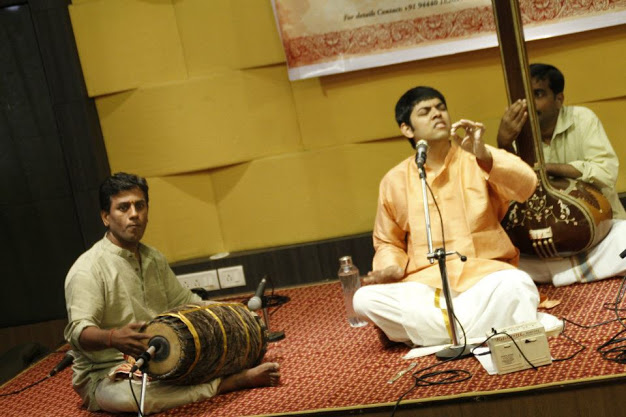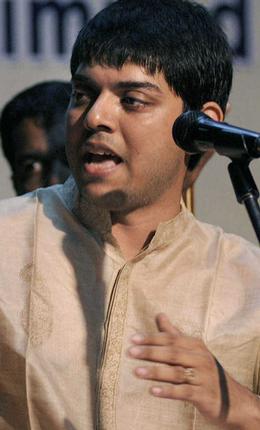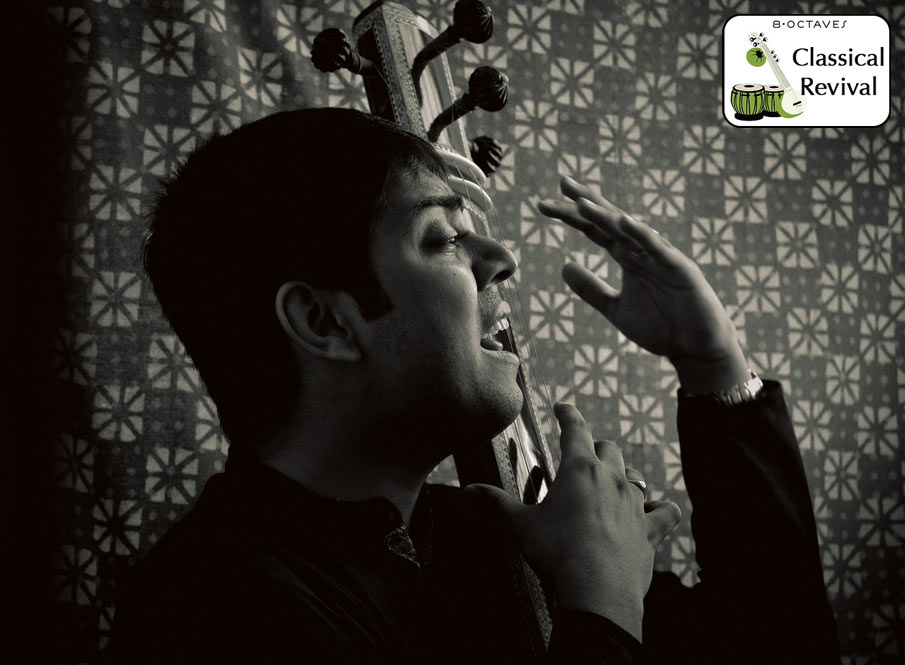Rithvik began his vocal training at a tender age of 5 and having a natural flair for it, he is involved with music full-time now.Currently the President of YACM (Youth Association for Classical Music),a premium organisation for Carnatic Music amongst the youth, he is involved with taking ‘music’ altogether to a different level.Having won major music competitions in Chennai,he has also been giving concerts in the December Season consistently right from 2005.
Eight Octaves: Congratulations on winning the esteemed ‘Yuva Kala Bharathi’ 2012 – Bharat Kalachar, Chennai. It must have been a moment of pride for sure. Share with us your musical journey. How did it all start?
Rithvik: Thank you very much for your wishes. More than a moment of pride, it was very humbling to receive the ‘Yuva Kala Bharathi’ as it is one of the most important awards for a young musician. I see it more as a source of encouragement given for my talent that helps me focus more and achieve greater things rather than something given for my accomplishments in the field of Carnatic Music.
My musical journey began at home. My mother Sudha Raja is a Carnatic and Choral Music teacher and she regularly had students at home when I was barely 2 years old. By the time I was 4, I started humming the tunes along with them while playing at home. My parents then said, why not sit with these other kids and sing? So that’s how I was initiated into music – in a very casual atmosphere where my mother was my first teacher, and where the joy of singing came from within.
Eight Octaves: Being trained under T.M. Krishna, a purist who keeps up with the traditional pattern of Carnatic music, what is your picture about the realm of Carnatic music? What do you think has helped you cross the boundaries of classicism?
Rithvik: Training under T.M. Krishna has been one of the most stimulating and educative experiences for me, apart from the lovely personal bond I share with him. He is a stickler for tradition and expects nothing less from me, be it my commitment towards music or my perfection for what has been taught by him. His dedication towards music while being a patient teacher is highly motivating for a student like me to put in more effort and I think I’ve been lucky to have such a wonderful guru guide me through my musical journey and teach me the importance of the core values of Carnatic music. I strictly believe in maintaining these very same values and try and expand the horizon of what music is, as perceived to be, within the boundaries of classicism. This is very important as tampering with these values means changing the aesthetic of the music itself.
Eight Octaves: You are the President of Youth Association for Classical Music (YACM) that dwells in diffusing Classical Music among the youth. What are the kinds of activities you do to promote Carnatic music? According to you, to what levels has the western music influx changed the mindset of the youth in the way they see Carnatic music?
Rithvik: The main aim of the Youth Association for Classical Music was to give a platform to the youth of Carnatic Music, back in 1985. YACM has successfully achieved this goal as every major concert series today has a slot for young musicians. After redefining the goals of the organizations, we felt that as much as the young need to be given opportunities, it is equally important to put more youngsters in the chairs of these concerts. So with this as the focus, YACM has been going to schools and introducing them to Carnatic Music and breaking the ice as something they can listen to and have fun with, just like any other form of music. It is important to sow the seeds into their minds at a young and impressionable age, which might help them create a liking towards this music in the future. The western influx is even more today, than in was 10 years ago thanks to mass media, Internet and television. To battle this and to bring our own cultures and traditions to the kids of our nation is becoming difficult, but not impossible. Its time the arts took these very powerful and effective tools and used them to its benefit to widen the reach among the younger generations.

Eight Octaves: What were your practice methods? A word of advice for the aspiring Carnatic musicians?
Rithvik: My practice methods during my early developmental stages were to sing in the morning and do my voice training exercises (also known as Akara Sadagam) and then practice for a while in the evening after I’m back from school or college. It was something I enjoyed doing and was never forced to sing. So I think that at some level, the idea of wanting to sing came to me naturally. But from my personal experience, I have learnt that listening to a lot of music and taking ideas from that and incorporating it into your own music with your originality and style is as important as singing and practicing your own music. After a number of years, the assimilation of ideas helps in creating new ones, which then becomes unique to you. How much of this do we do consciously and how much of it becomes imitative beyond a given point is a thread that we need to carefully needle.
Eight Octaves: Many people believe that the “December Music Season” is getting too commercialized. What is your take on it?
Rithvik: Maybe from the perspective of people who come and listen to the music and for those who are in the perimeter of the December Music Season, it certainly does look commercialized. But being bang in the middle of it, I can assure you that it is only about the music. Maybe the commercialization helps in bringing more people to the halls and in getting across to a larger spectrum of the audience, but what the musicians present and what the audience come for is essentially the music which is what drives this commercialization. People from all over the world come for the music and not for the stalls and the commercial aspect of it. But one thing I do feel strongly about is the sheer number of concerts during December and wonder if there is a need for this many concerts.
Eight Octaves: What are the changes you see in the way audience receive Carnatic music? Has the ‘critical’ knowledge come down compared to past years? If yes, why do you think so?
Rithvik: It is encouraging to see that many people still want to listen to Carnatic Music on a daily basis. But at some level, I feel that the absolute quantity of concerts in a year reduces their interest and curiosity in actually wanting to go and listen to a concert. That is where I feel that cities like Mumbai and Delhi really benefit. The fact that there are only 5-10 concerts a month makes sure that the Carnatic music loving population are driven to come to each and every one of these concerts in full attendance, irrespective of the artiste who is performing. That is not the case in Chennai. With respect to the ‘critical’ knowledge, there have always been different sections of listeners. Some who are very well informed, some who are knowledgeable, some who don’t know much but who are just there for the music as they enjoy it, and some who are there for their family or friends. The majority of this listening population today is driven by the past. They come with certain expectations from concerts that they have previously listened to from their favorite musicians from the bygone. Recordings have been a boon, but it also gives the listeners an opportunity to constantly compare and analyze the present musicians with the past greats as the benchmark. If even earlier recordings were available, would these past greats who are considered benchmarks today be compared to their predecessors? I feel that every artiste is her or her own musician and that this comparison or expectation for being X or Y’s student or from A or B’s parampara (lineage) isn’t healthy. Let artistes be themselves and lets go listen to them for what they have to offer rather than for what we want to hear.
Eight Octaves: What is your opinion about new genres like “Classical Rock” and “Classical Jazz” coming up? How do you think it is affecting the traditional “classical music”?
Rithvik: If we are talking about the traditional ‘Classical Rock and Classical Jazz’, which have been in vogue in the west for almost 40 years now, then they are quite established as separate genres of music. But if we are talking about the recently sprouted genres that incorporate Carnatic music into Rock and Jazz music, then I would have to say that there is still a long way for them to go in terms of exploration and character for them to be considered separate genres with original identity. The problem also lies with the fact that people expect and welcome anything that is new, which gives them the opportunity to try and do many new things and fuse genres just because there is a market for it. Whether the artistes from both these genres first understand their musical genre completely for them to fuse it with another is a different debate altogether.
Eight Octaves: Where do you see yourself in the next three years? Can you also tell us about your upcoming projects?
Rithvik: I don’t particularly see myself anywhere specific as long as I continue to enjoy my music and present it in a way that is natural, honest and from within me. I sing for myself and relish it. If the self-enjoyment of one’s own music isn’t there, then the presence of another entity during this process in enjoying the same music isn’t really healthy. Whether it is at a hall, temple or anywhere else, it doesn’t matter. I sing what I believe in and that is what helps me get across to the people who come to listen to me.With respect to my upcoming projects, I do try and dabble with a few ideas and implement them as projects, trying to experiment and understand these questions that I pose to myself from time to time. Most of my projects are a product of wanting to learn from them rather than to let people identify what I comprehend. I enjoy doing them as they keep me active and involved in areas other than just singing concerts. In today’s scenario, I think that we as musicians can do a lot more than just sing concerts. It is important for each and every one of us to present the art form in different ways to the public and play whatever small part we can to take the performing arts forward in this fast growing world. My most recent project deals with a similar issue. It is titled Kutcheri – ‘A Concert Experience’ which addresses the concept of how the Carnatic Music genre is presented to the public.

Eight Octaves: What is ‘Kutcheri’?
Carnatic Music is one of the most aesthetic and beautiful musical forms in the world. A pleasant atmosphere is created where the music is honest, natural and from the heart. For both the listener and the performer, the atmosphere in which we share this music is as much an experience as the music itself. It has the ability to enhance the experience and spur creative impulses. Kutcheri is an experiment to present the collective expression of a group of artistes coming together and presenting music that is vibrant, in a setting that is vivid and bright with colours and light. This project is to show that a little work can go a long way in creating a portrait that isn’t often seen or listening to music in a way that isn’t often experienced.
For more information, visit www.rithvikraja.com/kutcheri



